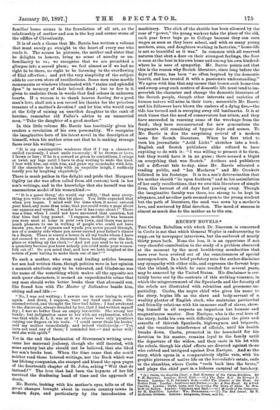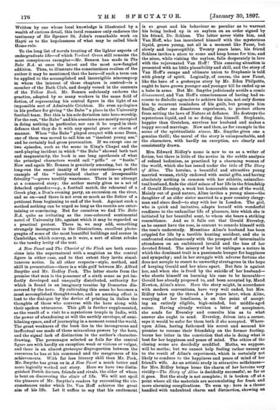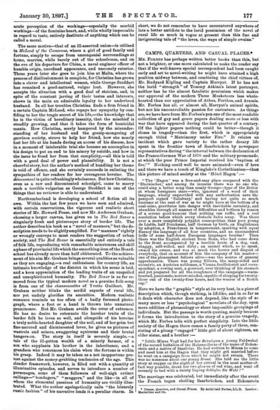RECENT NOVELS.*
THE Cuban Rebellion with which Dr. Emerson is concerned in Caoba is not that which General Weyler is endeavouring to. Bopp, ess by newspaper interviews, but the outbreak of nearly thirty years back. None the less, it is an opportune if not very cheerful contribution to the study of a problem obscured at the moment by the most bewildering mendacities that have ever been evolved out of the consciousness of special correspondents. In a brief prefatory note the author disclaim& any sympathy with either side, and expresses the fervent hope that the island, in which he once resided for several years, may be annexed by the United States. His disclaimer is cer- tainly borne out by the contents of this striking romance, in which the misgovernment of the Spaniards and the ferocity of the rebels are illustrated with relentless and gruesome im- partiality. Caoba, the negro chief who gives his name to. the story, begins life as the slave and body-servant of a, wealthy planter of English stock, who maintains patriarchal and friendly relations with his immense staff of slaves, show- ing himself in all respects an imperious but humane and magnanimous master. Don Enrique, who is the real hero of the story, holds his own with difficulty against the plots an assaults of thievish Spaniards, highwaymen and brigands, and the vexatious interference of officials, until his health breaks down. Caoba, promoted in the household for his devotion to his master, remains loyal to the family until the departure of the widow, and then caste in his lot with the rebels, though his chief efforts are directed against those who robbed and intrigued against Don Enrique. And so the story, which opens in a comparatively idyllic vein, with it& graphic pictures of native life on the hacendado's estate, end. in the shambles, where Caoba "reels back into the brute," and plays the chief part in a hideous carnival of butchery.
• (L) Caoba, the Guerilla Chief: a Real Romance of the Cuban Rebellion. By P. H. Emerson. London: David Nott.—(2.) The Babe B.A. By Ed.ard F. Benson. London: G. P. Putnam's 5one.—(3.) The Chariot of the Mesh. Byy. Hedley Peek. London Lawrence and Bullen.—(4.) A New Faust. By Alfred Smythe. London : Dishy, Long, and Co.—(5.) The Story of Aline. By Mrs. Eclw.rd Ridley. London : Chapman and ) McLeod of the CC141147011.. By H. Hamilton. London: Wm. Heinemann.—(7.) The Red Scaler. By P. Anderson Graham. London: Longmans, Green, and Co.
Written by one whose local knowledge is illustrated by a wealth of curious detail, this lurid romance only endorsee the testimony of Sir Spenser St. John's remarkable work on Hayti as to the hopelessness of what may be called black Home-rule.
To the long list of novels treating of the lighter aspects of undergraduate life—of which Verdant Green still remains the most conspicuous exemplar—Mr. Benson has made in The Babe B.A. at once the latest and the most new-fangled addition. Thus, to illustrate the conscientious realism of the author it may be mentioned that the hero—if such a term can be applied to the accomplished and incorrigible nincompoop in whom the interest of these chapters is centred—is a member of the Bath Club, and deeply versed in the contents et the Yellow Book. Mr. Benson sedulously eschews the practice, adopted by so many workers in the same field of fiction, of representing his central figure in the light of an impossible sort of Admirable Crichton. He even apologises in his preface for giving "the Babe" a place in the University football team. But this is his sole deviation into hero-worship. For the rest, "the Babe" and his associates are mostly occupied in doing nothing in particular, nor can it be urged in their defence that they do it with any special grace or charm of manner. When "the Babe" played croquet with some Dons, one of them was moved to call him an "insolent young ass," and he certainly had gross provocation. If we except one or two episodes, such as the scene in King's Chapel and the card-playing incident in which "the Babe" showed both tact and magnanimity, the book is one long apotheosis of what the principal characters would call " piffle " or "footle." Now and again Mr. Benson is genuinely amusing, but in the tong-run the smart inanity of the conversation—a perfect example of the "harebrained chatter of irresponsible frivolity "—grows terribly wearisome. There is no attempt at a connected story; the author merely gives us a set of detached episodes—e.g., a football match, the rehearsal of a Greek play, a Don's evening party, an excursion on the river, and so on—and there is not even so much as the flutter of a petticoat from beginning to end of the book. Against such a method nothing can be urged so long as the results are enter- taining or convincing. But for ourselves we find The Babe B.A. quite as irritating as the rose-coloured sentimental novel of University life, against which it may be regarded as a practical protest. There is, we may add, something -strangely incongruous in the illustrations, excellent photo- graphs of some of the most beautiful buildings and scenes in Cambridge, which convey, as it were, a sort of silent rebuke to the tawdry levity of the text.
A New Faust and The Chariot of the Flesh are both excur- -sions into the supernatural with a magician as the central figure in either case, and to that extent they invite simul- taneous notice. In all other respects—style, method, and skill in presentation—there is a wide gulf between Mr. Alfred Smythe and Mr. Hedley Peek. The latter starts from the premise that man is the possessor of a sixth sense as yet im- fectly developed and unequally distributed, authority for which is found in an imaginary treatise by Descartes dis- covered by the hero. By cultivating this sense he becomes a most accomplished thought-reader, and an amusing effect is lent to the dialogue by the device of printing in italics the thoughts of those who converse with the hero along with their spoken utterances. This gift is further supplemented, as the result of a visit to a mysterious temple in India, with the power of abandoning at will the earthly envelope, of anni- hilating space, and of journeying in a moment round the world. The great weakness of the book lies in the incongruous and ineffectual use made of these miraculous powers by the hero, and the signal lack of distinction in the author's character- drawing. The personages selected as foils for the central figure are with hardly an exception weak or vicious or vulgar, and there is an almost grotesque disproportion between the resources he has at his command and the meagreness of his achievements. With far less literary skill than Mr. Peek, Mr. Smythe has given us in A New Faust a much better and more logically worked out story. Here we have two distin- guished Dutch doctors, friends and rivals, the elder of whom is bent on discovering the elixir of life. We will not spoil the pleasure of Mr. Smythe's readers by recounting the cir- cumstances under which Dr. Van Hoff achieves the great aim of his life. Let it suffice to say that his excitement
is so great and his behaviour so peculiar as to warrant his being locked up in an asylum on an order signed by his friend, Dr. Schloss. The latter never visits him, and Van Hoff, who has inoculated himself with the mysterious liquid, grows young, not all in a moment like Faust, but slowly and imperceptibly. Twenty years later, his friend Schloss invites a niece to come and keep house for him, and the niece, while visiting the asylum, falls desperately in love with the rejuvenated Van Hoff ! This amazing situation is presented with no little plausibility and skill, and the story of Van Hoff's escape and ultimate union to Stephanie is told with plenty of spirit. Logically, of course, the new Faust, like the hero of a grotesque story by Mr. Eden Philpotts, ought to have grown younger and younger till he ended up as a babe in arms. But Mr. Smythe judiciously avoids a comic denouement, and Van Hoff's consciousness of having had re- course to diabolic agencies to achieve his aim, not only dooms him to recurrent reminders of his guilt, but prompts him finally, after one disastrous experiment, to protect others from setting the laws of Nature at defiance. He destroys the mysterious liquid, and in so doing dies himself. Stephanie, happier than Gretchen, survives her husband and makes a happy second marriage. Now and then, as for example in the scene of the spiritualistic seance, Mr. Smythe gives one a genuine thrill ; the moral of the story is unimpeachable, and the characters, with hardly an exception, are clearly and consistently drawn.
Mrs. Edward Ridley's name is new to us as a writer of fiction, but there is little of the novice in the subtle analysis of refined hedonism, as practised by a charming woman of the world, which she has issued under the title of The Story of Aline. The heroine, a beautiful and attractive young married woman, richly endowed with social gifts, and having absolutely nothing in common with her athletic, unintellec- Wel husband, finds the chief solace of her life in the friendship of Gerald Eversley, a weak but honourable man of the world. Mainly out of good nature, Aline invites a young niece—the daughter of an elder sister married to a poor country clergy- man and since dead—to stay with her in London. The girl, who is quick and imitative, adapts herself with wonderful readiness to the unfamiliar life of pleasure, into which she is initiated by her beautiful aunt, to whom she bears a striking resemblance. And so it falls out that Gerald Eversley, as he cannot have the rose, is content to console himself with the rose's understudy. Meantime Aline's husband has been crippled for life by a terrible hunting accident, and she is confronted simultaneously with the prospect of interminable attendance on an embittered invalid and the loss of her devoted friend. The misery of her lot unhinges a nature in which the dominant trait is a passionate hunger for happiness and sympathy ; and in her struggle with adverse fortune she does not scruple to resort to unworthy stratagems in the hope of keeping Gerald and her niece apart. But fate is against her, and when she is freed by the suicide of her husband— who shoots himself on learning his case to be incurable— Gerald has already proposed to, and been accepted by, Maud Newton, Aline's niece. Here the story might, in accordance with modern conventions, have very well ended, but Mrs. Ridley takes up the thread a few years later, when Aline, wearying of her loneliness, is on the point of accept- ing an entirely eligible, high-minded, but middle-aged suitor. Having already written a letter of acceptance, she sends for Eversley and consults him as to what answer she ought to send. Eversley, driven into a corner, says it would be safer for them both if she accepted. Where- upon Aline, having fathomed his secret and secured his promise to resume their friendship on the former footing, burns her letter in the conviction that she is doing what is best for her happiness and peace of mind. The ethics of the closing scene are decidedly muddled. Moths, we suppose, will be moths; but we cannot help feeling rather uneasy as to the result of Aline's experiment, which is certainly not likely to conduce to the happiness and peace of mind of her friend's wife. As an artistic study in attractive selfishness— for Mrs. Ridley brings home the charm of her heroine very vividly—The Story of Aline is decidedly successful, so far as it goes. But the study is not complete; it is broken off at a point where all the materials are accumulating for fresh and more alarming complications. To sum up : here is a theme handled with undoubted charm and distinction, showing an
acute perception of the workings—especially the morbid workings—of the feminine heart, and, while wholly impeccable in regard to taste, entirely destitute of anything which can be called a moral.
The same motive—that of an ill-assorted union—is utilised in McLeod of the Camerons, where a girl of good family and fortune, simply to escape from uncongenial surroundings at home, marries, while barely out of the schoolroom, and on the eve of his departure for China, a naval engineer officer of humble origin, unrefined appearance, and uncomely exterior. Three years later she goes to join him at Malta, where the process of disillusionment is complete, for Christina has grown into a clever and intellectual woman, while George Stoddart has remained a good-natured, vulgar lout. However, she accepts the situation with a good deal of stoicism, and, in spite of the constant jarring of their tastes and interests, shows in the main an admirable loyalty to her underbred husband. In all her troubles Christina finds a firm friend in a certain Captain McLeod, who repays her sympathy by con- fiding to her the tragic secret of his life,—the knowledge that he is the victim of hereditary insanity, that the mischief is steadily growing, and that it takes the form of homicidal mania. How Christina, sorely hampered by the misunder- standing of her husband and the gossip-mongering of garrison society, strove to help her friend, how she nearly lost her life at his hands during an access of his disease, how in a moment of intolerable trial she became an accomplice in his design to put an end to his misery by suicide, and how in the issue he freed her from that complicity,—all this is told with a good deal of power and plausibility. It is not a cheerful story, but the author's method of handling her theme is void of offence, and she certainly succeeds in enlisting the sympathies of her readers for her courageous heroine. The denouement is quite refreshingly wholesome. But how Christina, even as a raw and discontented schoolgirl, came to marry such a terrible vulgarian as George Stoddart is one of the things that no reviewer is able to understand.
Northumberland is developing a school of fiction all its own. Within the last few years we have seen and admired, with certain reservations, the vigorous and realistic short stories of Mr. Howard Pease, and now Mr. Anderson Graham, choosing a larger canvas, has given us in The Red Scaur a singularly fresh and picturesque story of border life. The author describes his book as a "novel of manners," but the de- scription needs to be slightly amplified. For "manners" rightly or wrongly conveys to most readers the suggestion of urban society, and The Red Scaur is essentially and entirely a tale of folk life, reproducing with remarkable minuteness and skill aphase of provincial life which the smoothing-iron of the Board- school has already more than half obliterated. To the achieve- ment of his aim Mr. Graham brings several qualities as valuable as they are engaging,—a real enthusiasm for country life, an intimate knowledge of the district in which his scene is laid, and a keen appreciation of the leading traits of an unspoiled and unsophisticated humanity. The Red Scaur is as far re- moved from the typical modern novel as a genuine folk-song is from one of the chansonnettes of Yvette Guilbert. Mr. Graham neither blinks the sordid aspects of rural life, nor yet unduly glorifies its amenities. Modern realistic romance reminds us too often of a badly focussed photo- graph, where a foot or a hand is thrown into unnatural prominence. But Mr. Graham avoids the error of extremes. He has no desire to extenuate the harsher traits of the border folk he loves so well, and alongside of his heroine a truly noble-hearted daughter of the soil, and of her grim but fine-natured and disinterested lover, he gives us pictures of wastrels and misers, swaggering squireens and their brutal hangers-on. The story in itself is severely simple, —a tale of the ill-gotten wealth of a miserly farmer, of a son who supplants his brother in the inheritance, and a grandson who renounces his claim when the fortune is within his grasp. Indeed it may be taken as a not inopportune pro- test against the money-grubbing tendencies of the age. This slender framework, however, is filled out with a quantity of illuminative episodes, and serves to introduce a number of personages, some of them followers of well-nigh extinct callings—" bondagers," "muggers," and the like—in all of whom the elemental passions of humanity are vividly illus- trated_ What the author apologetically calls "the leisurely rustle fashion" of his narrative lends it a peculiar charm. In
short, we do not remember to have encountered anywhere of late a better antidote to the lurid pessimism of the novel of rural life so much in vogue at present than this fine and invigorating tale of "the loves, the ways of simple swains."




















































 Previous page
Previous page